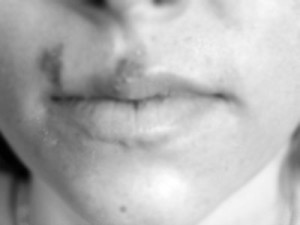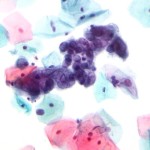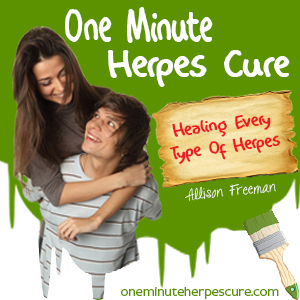As much as you dread entertaining the thought of the possibility of having contracted herpes, understanding the symptoms of herpes can lead to an early detection and subsequently, a treatment suitable for your specific type of herpes. You can also avoid infecting other people with this disease by taking the necessary precautions, but you can only do this if you’re aware of its existence in your body.
Basically, since sores or blisters or lesions are signs that something is wrong with your body, ignoring them is generally a bad idea. Even if you’re fairly certain that the rash around your mouth can be attributed to something other than herpes, it’s always prudent to see a doctor and effectively eliminate herpes as a possible suspect.
What is Herpes?
 Herpes Simplex is a very common infection. It is a viral disease from the herpesviridae family caused by two different but closely related viruses. The viruses are herpes simplex virus type 1 (HSV-1) and herpes simplex virus type 2 (HSV-2). Both are easy to catch. They remain in the body and can be very difficult to eradicate. They produce symptoms that come and go.
Herpes Simplex is a very common infection. It is a viral disease from the herpesviridae family caused by two different but closely related viruses. The viruses are herpes simplex virus type 1 (HSV-1) and herpes simplex virus type 2 (HSV-2). Both are easy to catch. They remain in the body and can be very difficult to eradicate. They produce symptoms that come and go.
Both forms of herpes can infect the oral area, the genital area, or both. When the infection is on or near the mouth, it is called oral herpes. Oral herpes is caused most often by HSV-1. When a herpes infection is on or near the sex organs, it is called genital herpes.
Herpes Symptoms
Genital herpes is caused most often by HSV-2. Up to 8 out of 10 American adults have oral herpes. And about 1 out of 4 American adults have genital herpes. Millions of people do not know they have herpes because they never had, or noticed, the herpes symptoms. That’s because in most people it produces no or very mild symptoms.
Oral Herpes Symptoms
When a person has oral herpes, ‘cold sores’ or ‘fever blisters’ can show up on the lips or around the mouth. These sores may also show up inside the mouth, but this usually only happens the first time oral herpes symptoms appear. Symptoms may last a few weeks and go away. They may return in weeks, months, or years. They are annoying but usually harmless in children and adults. But cold sores can be very harmful to a newborn.
Genital Herpes Symptoms
 Most people with genital herpes have no symptoms, have very mild symptoms that go unnoticed, or have symptoms but do not recognize them as a sign of infection. The most common herpes symptom is a cluster of blistery sores — usually on the vagina, vulva, cervix, penis, buttocks, or anus. Symptoms may last several weeks and go away. They may return in weeks, months, or years.
Most people with genital herpes have no symptoms, have very mild symptoms that go unnoticed, or have symptoms but do not recognize them as a sign of infection. The most common herpes symptom is a cluster of blistery sores — usually on the vagina, vulva, cervix, penis, buttocks, or anus. Symptoms may last several weeks and go away. They may return in weeks, months, or years.
The first time that genital herpes symptoms appear is called ‘first episode’ or ‘initial herpes.’ The initial herpes symptoms are usually more noticeable than later outbreaks.
Genital herpes symptoms may include:
• Blisters
• Burning feelings if urine flows over sores
• Inability to urinate if severe swelling of sores blocks the urethra
• Itching
• Open sores
• Pain in the infected area
During initial herpes, symptoms may also include:
• Swollen, tender glands in the pelvic area, throat, and under the arms
• Fever
• Chills
• Headache
• General run-down feelings
• Achy, flu-like feelings
When there are initial herpes symptoms, they usually appear from 2 to 20 days after infection. But it may be years before the first symptoms appear.
Initial herpes sores usually heal in about 2 to 4 weeks. But the virus stays in the body. It can flare up and cause sores again. Symptoms from flare-ups usually heal in 10 to 14 days. Herpes symptoms may be more painful and last longer in women or men with illnesses that weaken the immune system — like leukemia and HIV.
Do I Have Herpes?
Only a health care provider can diagnose herpes by performing a physical exam and tests. A blood test can tell if you are infected with oral or genital herpes — even if you don’t have symptoms. Health care providers can also confirm herpes infection by testing fluids taken from the sores.
Lastly, if it turns out that you do have herpes, it’s not the end of the world. You might have to make a few adjustments in your life to cope with this disease, but that doesn’t mean you can’t continue to have a normal life.
It’s perfectly understandable to have some “poor lil’ ole me” moments. Allow yourself to experience them fully, but try not to wallow in them for too long. Instead, empower yourself with knowledge and find that inner strength to accept this condition and go on living.








 Saving...
Saving...
Pingback: Love and Herpes - STDZip
Pingback: Oral Herpes: Causes, Symptoms and Treatments - STDZip
Pingback: How Does Oral Herpes Transmission Occur? - STDZip.com
Pingback: Video - Herpes Symptoms Explanation